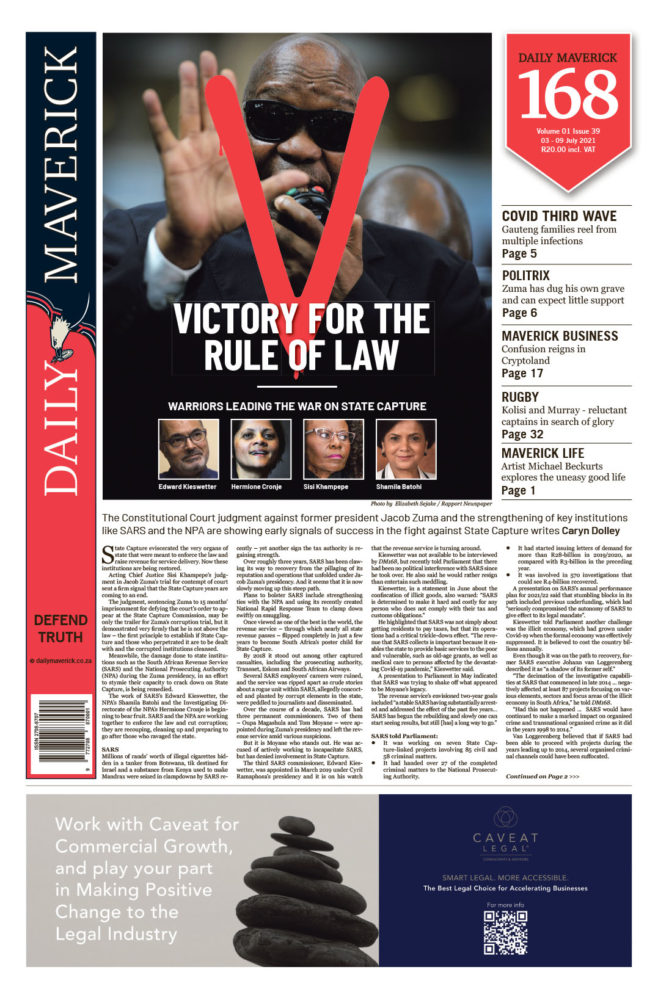BUSINESS MAVERICK 168
Confusion reigns in Cryptoland while Reserve Bank and National Treasury dither on legislation

Unless the South African Reserve Bank and National Treasury move quickly to create enabling legislation on cryptocurrencies and trading, things are going to become farcical.
First published in the Daily Maverick 168 weekly newspaper.
Recent news reports relating to cryptocurrencies and how South Africans can trade in these assets suggest that the South African Reserve Bank (Sarb) and National Treasury are getting tripped up by their own rhetoric.
It all comes down to definitions. What is capital? And what is currency? And if something is neither, can Sarb prevent you from buying it using a credit card – presuming it falls within the legal forex limits? And, by the same token, can the SARB prevent you from moving it offshore once purchased on a local platform – again assuming you comply with forex regulations? The answer, theoretically, is no. Except that in recent days Sarb has quietly made the answer to both of these an unequivocal yes.
It seems to be a case of having your cake and eating it, as the National Treasury, which creates the enabling legislation, battles with how exactly to fit crypto assets into the current financial reporting framework. It’s like trying to fit a square peg into a round hole.
To illustrate this point, three years ago VALR, a crypto asset trading platform, was in the process of setting up shop locally. It had funding from international backers and asked Sarb, via an authorised dealer – in other words, a bank – for approval to bring the funds into the country via Bitcoin. Permission was declined. The reason was that Sarb does not view Bitcoin or any other crypto as currency or capital in terms of exchange control regulations. If the entry of capital is not recognised, then it cannot be externalised should the investors want to exit was the reasoning given.
Similarly, if an individual was to repatriate funds into South Africa using crypto assets, this would not be reflected against their R1-million offshore allowance, once again because the regulators view cryptos as an asset, but not as currency or capital.
Yet in recent weeks Sarb appears to have quietly leaned on the banks to prevent them from allowing clients to use their credit cards to purchase crypto assets from offshore platforms like Coinbase, Gemini and Binance. It is not permissible to purchase US dollars or any other currency using a credit card, but if crypto assets are not recognised as capital or currency, what is the problem?
When contacted for insight, Standard Bank replied that clients are obliged to comply with all foreign exchange control regulations. An Absa spokesperson said that purchasing cryptocurrencies on debit and credit cards is not permissible in SA (an about-turn from an earlier position). Nedbank and FNB would not comment on the matter.
Adding to the confusion, it has recently come to light that, although purchasing crypto assets off local exchanges like Luno and VALR or investment platform Revix is tolerated (but not yet regulated), it is a criminal offence to transfer crypto assets bought on a local exchange to one located outside the country.
This came as a surprise to all of the exchanges. “There is a lot of confusion in the market,” says Marius Reitz, GM for Luno in South Africa. “Even if we were regulated, and there was a reporting regime in place, it would be very difficult to report foreign transactions.” That’s because, once a client takes custody of their Bitcoin or Ethereum, it is impossible to track. “We don’t know if it is stored locally, internationally or on a hardware wallet.”
“These assets are borderless,” adds Farzam Ehsani, CEO and co-founder of VALR. Without getting too technical, he explains that crypto assets are represented on the blockchain by a public key and a private key (the latter is used to produce your digital signature that tells the network you have the right to transact that money). Assuming you can remember this private key in your brain, you could argue that your Bitcoin is now in a “brain wallet”. Depending on where you travel, you could argue that capital has been “externalised” according to current rules, and that’s assuming that the crypto asset is defined by the location of the private key. Usually, however, an asset is recognised to be onshore or offshore, depending on where the ledger it is recorded on is situated. In the case of a crypto asset on a blockchain, that asset is here, there and everywhere at the same time, because the ledger exists simultaneously across tens of thousands of computers across the world. “What we have are analogue rules for digital times,” says Ehsani.
To be fair to South African regulators, they have not been napping and all seven regulators recently published a position paper on crypto assets that sets the stage for the regulation of exchanges and other platforms that onboard clients. This would see these firms applying Know Your Customer and anti-money laundering provisions. They will also become accountable institutions in terms of the Financial Intelligence Centre Act.
What seems to have rattled Sarb, and possibly the banks, is the size and scale of two recent scams involving crypto assets.
New York-based Chainanalysis, a blockchain analysis firm, recently named Mirror Trading International (MTI), a South African company trading from Randburg, as the biggest crypto scam of 2020, taking in $589-million’s worth of cryptocurrency across more than 471,000 deposits. Crypto was the asset used, but in reality it was a giant multilevel marketing scheme that persuaded users to deposit a minimum of $100’s worth of Bitcoin with them, which MTI promised to grow using AI-powered foreign exchange trading software. The site promised daily returns of 0.5%, which translates to yearly gains of 500%. South African regulators have acted to close down the company and creditors have applied for its liquidation, but the founder has disappeared with the cash.
Similarly, the story of Africrypt, founded and run by Ameer and Raees Cajee, has alarmed regulators because the site looks suspiciously like a money-laundering scheme. The brothers disappeared with an unquantifiable amount of Bitcoin, after claiming the platform had been hacked.
“The total holdings of crypto assets in SA are relatively low,” said a Sarb insider. “But what is concerning us is that there is a disproportionate rise in scams for an asset of this size.”
Globally governments are grappling with ways to regulate the industry. Earlier this month the Basel Committee, the world’s most powerful banking standards-setter, recommended cryptocurrencies carry the toughest bank capital rules of any asset, arguing that requirements for holding Bitcoin and similar tokens should be far higher than those for conventional stocks and bonds.
The Bank for International Settlements, the global body for central banks, has intensified its criticism of cryptocurrencies, saying that digital tokens such as Bitcoin have few redeeming features and “work against the public good”.
South Africa is falling behind the curve and the regulators know it. “We are critically aware of the confusion reigning and will put out a statement soon,” said another Sarb insider. National Treasury officials are also trying to coordinate a position, and were unable to respond to questions put to them on 29 June. DM168
This story first appeared in our weekly Daily Maverick 168 newspaper which is available for free to Pick n Pay Smart Shoppers at these Pick n Pay stores.




















 Become an Insider
Become an Insider
Comments - Please login in order to comment.